 Hartlepool Sports & Leisure
Hartlepool Sports & Leisure
- Cinemas, Theatres & Dance Halls
- Musicians & Bands
- At the Seaside
- Parks & Gardens
- Caravans & Camping
- Sport
 Hartlepool Transport
Hartlepool Transport
- Airfields & Aircraft
- Railways
- Buses & Commercial Vehicles
- Cars & Motorbikes
- The Ferry
- Horse drawn vehicles
 A Potted History Of Hartlepool
A Potted History Of Hartlepool
- Unidentified images
- Sources of information
- Archaeology & Ancient History
- Local Government
- Printed Notices & Papers
- Aerial Photographs
- Events, Visitors & VIPs
 Hartlepool Trade & Industry
Hartlepool Trade & Industry
- Trade Fairs
- Local businesses
- Iron & Steel
- Shops & Shopping
- Fishing industry
- Farming & Rural Landscape
- Pubs, Clubs & Hotels
 Hartlepool Health & Education
Hartlepool Health & Education
- Schools & Colleges
- Hospitals & Workhouses
- Public Health & Utilities
- Ambulance Service
- Police Services
- Fire Services
 Hartlepool People
Hartlepool People
 Hartlepool Places
Hartlepool Places
 Hartlepool at War
Hartlepool at War
 Hartlepool Ships & Shipping
Hartlepool Ships & Shipping

Bunting Family Album
Details about Bunting Family Album
A selection of family photographs kindly shared with this project by Mr. Edward Bunting.
Location
Related items :
 At the Palace (1)
At the Palace (1)
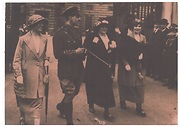 Donated by Derek Bunting
Donated by Derek BuntingDated 1919
Captain John (Jack) Shepherd Allison Bunting with his mother and sisters outside Buckingham Palace. Captain Bunting had just been presented with the Military Cross by King George V, for conspicuous gallantry and devotion to duty while on the Front Line during the First World War.
More detail »
 At the Palace (2)
At the Palace (2)
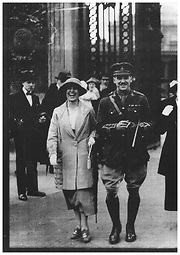 Donated by Derek Bunting
Donated by Derek BuntingDated 1919
Captain John (Jack) Bunting pictured with his sister outside Buckingam Palace. Captain Bunting had just been presented with the Military Cross for gallantry by King George V.
More detail » Guard of Honour
Guard of Honour
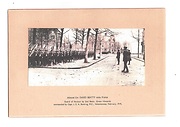 Donated by Derek Bunting
Donated by Derek BuntingDated 1919
The Guard of Honour by the 2nd Battalion Green Howards, commanded by Captain J.S.A Bunting MC, greets Admiral Sir David Beatty at Valenciennes, France.
More detail » J.S.A. Bunting M.C.
J.S.A. Bunting M.C.
This is the career of John (Jack) Bunting told in his own words and in those of his nephew, Derek Bunting. The attitudes and opinions expressed in this account are those of a different era.
John Shepherd Allison Bunting was born on 12th May 1898 in Seaton Carew, near Hartlepool, on the coast of County Durham. He was the youngest of four children of Charles John Bunting, a Hartlepool solicitor.
Jack, as he was always known, went to the High School in Hartlepool from 1908 till 1912 before going to Kings College, London University until 1915 with a view to a career in the Civil Service. But the Great War interviened. He tried to enlist in the Army when just 16 but a family friend, Sir Neville Gunter, who was then commanding the 3rd Battalion of the Yorkshire Regiment (The Green Howards) thought he was officer material and got him entered for Sandhurst. Jack was commissioned from there direct into Gunter's regiment on 25th September 1915, aged just 17.
2nd Lieutenant Jack Bunting went to France with his regiment in July 1916 to Armentieres. He was wounded in September 1916 in the first ever tank attack at Martinpuich - Flers Ridge at the Battle of the Somme and was sent home for convalescence. He returned to the Front on his 19th birthday in May 1917, spending the following winter in the Ypres salient. In July 1917, aged just 19, as a Lieutenant he commanded a Company of the 2nd Battallion Green Howards in their first wave of the attack on Bodmin Copse when they went over the top from the tip of the Ypres Salient.
As Lieutenant (acting Captain) he commanded a company of the 2nd Battalion at Roupy when the Germans counterattacked on 21st March 1918. The Green Howards were then forced to take part in the retreat of the British 5th Army and the Green Howards were defending the main road south of St Quentin and suffering heavy casualties. He was awarded an MC for which his citation reads:
"For conspicuous gallantry and devotion to duty. When in command of a company he resisted for 24 hours repeated attacks of the enemy, inflicting great losses on them. In the rearguard action on subsequent days he rallied his men with skill and courage until finally wounded."
He was wounded by machine gun fire on 28th March 1918. The bullet went clean through his thigh.
After being in hospital in England, as soon as he was passed fit he returned to France. He said later "I was young and healed very rapidly". He then commanded a Company of the 2nd Battalion Green Howards and led his men over the top on 2nd November 1918. He continued attacking until orders were recieved to halt hostilities when about 12 miles south of Mons on the French - Belgian border. He later wrote about this attack "On November 6th, when trying to cross a small river, the Germans opened up with heavy machine gun and rifle fire and the Company ahead of us was practically annihilated - all the officers killed or missing. After 9 days continuous attack in foul weather and no rations except the roots we scrounged from the fields and the little we carried, we were in a terrible state. The Bosche had destroyed bridges as they retreated and no cookers or transport of any kind could catch up with us. Some of the men had to have their boots cut off, so swollen were their feet."
Captain Jack Bunting was in charge of the Guard of Honour when Admiral Sir David Beatty, in command of the Grand Fleet, toured the battlefields after the end of hostilities. The Regimental Colours had by then arrived from England with the Regimental Band. He celebrated his 21st birthday party at the Officers' Club in Valenciennes on 12th May 1919. He later brought back the transport of the Battalion to their Regimental Headquarters in Richmond, North Yorkshire, via Dunkirk.
Jack's elder brother was my father Charles Gilbert Bunting and he also had two sisters; Kathleen (or Kit), who married Arnold Jones, a Director of Gray's shipyard, who lived in Hartlepool. They had one son, Dall. His other sister, Beatrice (or Bea) married Pier Rosling, who was General Manager of Henleys Telegraph Co and lived in Farnham, Surrey. Jack went to Buckingham Palace to be presented with his Military Cross by King George V. He was accompanied to the Palace by his mother and both his sisters.
Jack was very fortunate to survive. The Ypres Salient was defended by Commonwealth forces throughout the War. No less than 185,000 lives were lost there. I visited the Menin Gate in Ypres last year. This memorial commemorates 54,000 officers and men from the UK, Canada, Australia, India and South Africa who had died by 1916. I also went to the beautifully kept Tyne Cot cemetery where a further 35,000 are remembered. Over 40,000 of them were never identified but have headstones. 100,000 have no known grave.
After the War Jack was asked for his comments by the Royal Military Academy at Sandhurst. These were some of his replies:
I liked and admired the Regular Officers and I was accepted for a regular commission but resigned in 1920 having doubts about peacetime soldiering.
I think nearly all of us had the utmost contempt for anyone not prepared to fight for their kith and kin and their country no matter what reasons they might give. Life was pretty cheap to us and I think most of us would have approved of them being shot as traitors.
We were in a hurry in 1914 to get into the army in case the war was over before we could do our bit but I certainly do not think we ever contemplated a long war of attrition.
It was certainly very frightening at times and darned uncomfortable - sometimes one felt it would never end and one could become very depressed. The cheerful sense of Regimental camaraderie kept one going.
The New Zealand troops were fine soldiers. I thought the French were poor, dirty, undisciplined and totally unreliable.
After the War Jack joined Henleys Cables and became Sales Manager. He joined AEI in 1946 and became Managing Director of Edison Swan Cables. After the merger with Siemens he became Joint General Manager of the cable division of this very large public company. Oliver Lyttleton MP and Colonial Secretary, who became Lord Chandos, was Chairman of the company. Jack became Chairman of the Cable Makers Association. He was a member of the Grand Council of the Federation of British Industries. He retired from the Board of Associated Electrical Industries in 1962, later becoming Chairman of the British Group of the International Cable Development Corporation.
He retired to his house at St Margarets Bay, on the White Cliffs close to Dover. He had married Gertrude in 1930 and they had a son, the Reverend Jeremy John Bunting, born 1934, who went to school at Tonbridge and then to Cambridge University.
Jack played rugby and soccer for the 4th Army in France. After the War he played cricket for Hampstead, rugby for Richmond, soccer for the Casuals and golf at The Wildernesse and Walmer and Kingsdown golf clubs in Kent.
My father, Charles Gilbert Bunting, Jack's elder brother, served as a Captain in the Royal Artillery in Hartlepool during the Great War. After the War he ran a very successful firm of solicitors in Hartlepool. He married Joyce Hopkinson in 1927 and they had three sons; Gerald, born 1928, Derek (your correspondent) born 1932 and Edward, born 1936.
My father died in 1967 aged 78. Jack's wife, Gertrude, died in 1968 and with both of them widowed and living on their own my mother and Jack decided to get married, which they did in 1971. They had 16 very happy years together living in Jack's house at St Margarets Bay in Kent which looks out from the top of the White Cliffs of Dover towards France. Jack died in March 1987 aged 88. He was buried in the Seaton Carew churchyard with his mother and father, brother and other members of the Bunting family.
After Jack died Joyce returned to rejoin her many old friends in Hartlepool in 1987 and died there in 1994 aged 88. She is also buried at Seaton Carew beside her two husbands.
Derek Bunting
April 2013
More detail »
 Kitty Bunting
Kitty Bunting
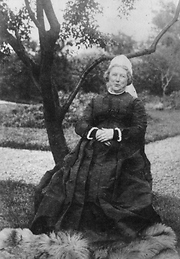 Donated by Mr. Edward Bunting
Donated by Mr. Edward BuntingMrs. Kitty Bunting, Edward Bunting's Grandmother.
More detail » Wedding photo - Jack and Gertrude Bunting
Wedding photo - Jack and Gertrude Bunting
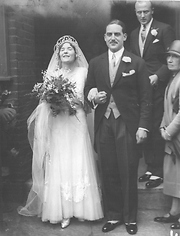 Donated by Mr. Edward Bunting
Donated by Mr. Edward BuntingDated 1930
A wedding day photograph of Jack and Gertrude Bunting (nee Brauen), circa 1930.
More detail » Youngsters playing on the beach
Youngsters playing on the beach
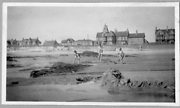 Donated by Mr. Edward Bunting
Donated by Mr. Edward BuntingYoungsters playing on the beach in front of the Staincliffe Hotel at Seaton Carew, date unknown.
More detail »



